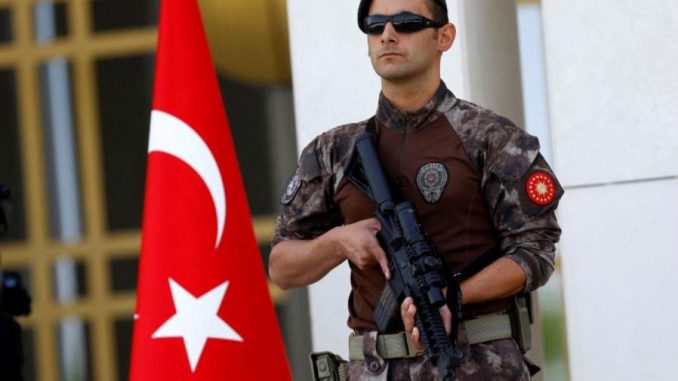US has struggled to formulate a policy towards Turkey that satisfies all its needs.

When it comes to Turkey, the US is faced with a dilemma. Initial enthusiasm for regime change in Syria gradually waned when it was realized that one of the actors in the proxy war, Turkey, was furthering its own agenda with US support. The spectacular failure of the half-a-billion-dollar program to train Syrian rebels was one marker to signal the end of this policy and make way for another objective: the defeat of Islamic State.
This in turn has led to the realization that the only effective boots on the ground are the predominantly Kurdish SDF (Syrian Democratic Forces), which with US advisers and materiel is leading the assault on the ISIS stronghold, Raqqa. The bone of contention is that the YPG (People’s Protection Units), which makes up the backbone of the SDF, is considered by Turkey to be the Syrian counterpart of Turkey’s PKK (Kurdistan Workers’ Party), which both the US and Turkey have designated as a terrorist organization.
President Barack Obama gave Turkey carte blanche to reignite its war with the PKK in July 2015 in return for access to Incirlik airbase in southern Turkey. The same day vice president Joe Biden landed in Ankara last August to make nice with Turkey after the attempted coup, Turkey launched a cross-border operation into Syria to block an attempt to create a contiguous Kurdish zone along Turkey’s southern border. Now Turkish forces are stuck west of the Euphrates, but Turkish President Recep Tayyip Erdogan threatens with a new cross-border operation against the Kurdish canton of Afrin in Syria’s northwest corner.
President Obama’s decision in October 2014 to airdrop supplies to Kurdish forces besieged by ISIS in Kobane was a thorn in Turkey’s eye, whereas Erdogan’s meeting with his successor in May was a bitter disappointment. Instead of entering into an alliance with Turkey to defeat ISIS, President Donald Trump approved the Pentagon’s plan to supply arms to the Syrian Kurds. The only concrete outcome of the visit was the passing of an unanimous resolution by the House of Representatives condemning the attack by President Erdogan’s security detail on demonstrators outside the Turkish ambassador’s residence. The security officials have also been indicted by a grand jury for violence.
A further aggravation was remarks late July by US special envoy Brett McGurk at the Middle East Institute in Washington, where he blamed the flow of weapons and foreign fighters into Syria for the creation of an al-Qaida safe haven at Idlib “right on the border of Turkey.”
Turkey considered McGurk’s statements provocative, as the US itself supported a terrorist organization (YPG). At his meeting with US Defense Secretary James Mattis in Ankara last week President Erdogan expressed Turkey’s unease at continued US support for the YPG, although Mattis assured his host the alliance was temporary and “not a choice but a necessity.” If this is the case, the US will once again leave the Kurds in the lurch.
On the other hand, in a telephone conversation in May between President Erdogan and Russian President Vladimir Putin both expressed a commitment to furthering their strategic partnership, including trade and joint energy projects. Furthermore, they confirmed their cooperation in the Astana process and the creation of de-escalation zones in Syria. The crunch will come when it comes to determining the future of Syria’s Kurds and their demand for regional autonomy.
President Erdogan has warned Turkey will not permit “a terror corridor” in northern Syria and will intervene “whatever the cost.”
When in Ankara, Secretary Mattis also met with Turkey’s defense minister, Nurettin Canikli, where they discussed the importance of Syria and Iraq’s territorial integrity and concern over “Iran’s malign influence in the region.” A week earlier when Iran’s chief of staff General Bagheri visited Turkey, President Erdogan declared that a joint operation with Iran against the PKK in Iraq was on the government’s agenda.
The situation has been further complicated by the Kurdish Regional Government’s president Masoud Barzani’s intention to hold a referendum on independence on September 25.
Relations between Europe and Turkey are already strained, as an overwhelming majority of the European Parliament in July called for a suspension of accession talks. The EU’s enlargement commissioner Johannes Hahn has declared it is time for member states to discuss the strategic implications of Turkey’s behavior, as “shrugging alone is not a political strategy.” Similarly, in view of the turn events are taking, a review of US policy would be timely.
If the deal is finalized, Turkey’s purchase of Russia’s S-400 missile system will make nonsense of its NATO membership. The director of Russia’s Federal Service for Military-Technical Cooperation (FSMTC), Dmitry Shugaev, has also said that all decisions regarding delivery of the S-400 missile system to Turkey correspond with Russia’s geopolitical and strategic interests.
In addition, the charge by a Turkish court that American pastor Andrew Brunson attempted to destroy constitutional order and overthrow the Turkish parliament is a blatant attempt to pressure the US into handing over the Turkish imam Fethullah Gulen, who is accused by Turkey of masterminding the attempted coup, and dropping charges against Reza Zarrab, an Iranian-Turkish businessman, who is indicted for conspiring to evade sanctions against Iran.
The author is a regular commentator on Turkish affairs in the Danish and international press.



Leave a Reply
You must be logged in to post a comment.